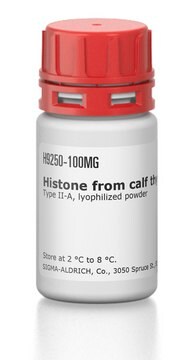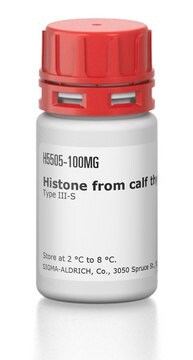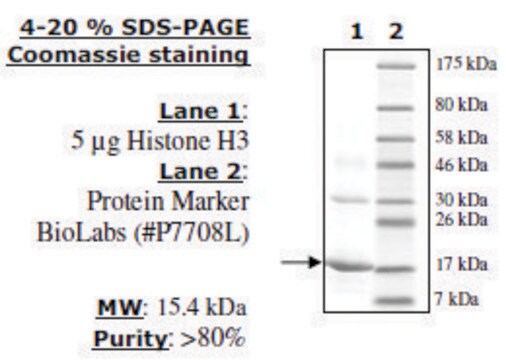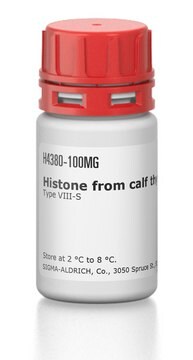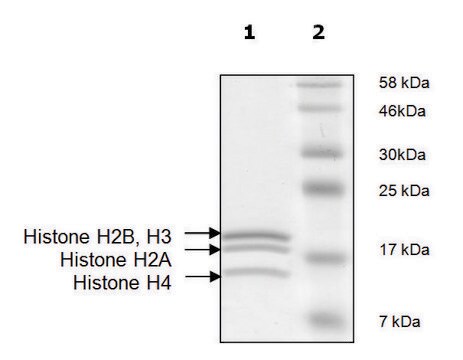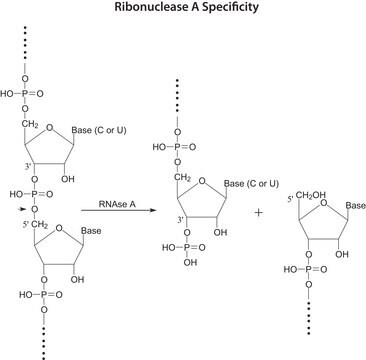14-155
Histone H1 Protein, 20 mg
Purified bovine Histone H1 protein for use as a substrate in histone modification assays (HAT, HDAC, DNMT) and chromatin assembly studies.
Synonym(s):
Linker Histone H1
Sign Into View Organizational & Contract Pricing
Select a Size
All Photos(1)
Select a Size
Change View
About This Item
UNSPSC Code:
12352202
eCl@ss:
32160405
NACRES:
NA.32
Recommended Products
biological source
bovine
Quality Level
mol wt
Mw 32 kDa
manufacturer/tradename
Upstate®
technique(s)
activity assay: suitable (kinase)
NCBI accession no.
UniProt accession no.
shipped in
dry ice
General description
H1 and related linker histones are important both for maintenance of higher-order chromatin structure and for the regulation of gene expression. Nucleosomal stabilization is provided through the binding of histone H1 to the nucleosomal dyad and the linker DNA entering and exiting the core particle. Additional experimental evidence illustrates the influence of histone H1 on chromatin arrangement and compaction. The family of histone H1 proteins contains five somatic variants (H1.1, H1.2, H1.3, H1.4 and H1.5) which are expressed in nearly all cell types.
Product Source: Lysine rich fraction from calf thymus
Quality
Routinely evaluated by Kinase assay using cdk2/cyclin A, active (14-448) to phosphorylate Histone H1.
Physical form
Sterilized through a 0.2 micron membrane filter
Storage and Stability
1 year at -20°C
Other Notes
For Specific Activity data, refer to the Certificate of Analysis for individual lots of this enzyme.
This product is derived from bovine source. Export of this product to certain countries may be restricted. Please contact Customer Service or your local distributor to inquire about product availability and export options.
Legal Information
UPSTATE is a registered trademark of Merck KGaA, Darmstadt, Germany
Disclaimer
Unless otherwise stated in our catalog or other company documentation accompanying the product(s), our products are intended for research use only and are not to be used for any other purpose, which includes but is not limited to, unauthorized commercial uses, in vitro diagnostic uses, ex vivo or in vivo therapeutic uses or any type of consumption or application to humans or animals.
Storage Class Code
12 - Non Combustible Liquids
WGK
nwg
Flash Point(F)
Not applicable
Flash Point(C)
Not applicable
Certificates of Analysis (COA)
Search for Certificates of Analysis (COA) by entering the products Lot/Batch Number. Lot and Batch Numbers can be found on a product’s label following the words ‘Lot’ or ‘Batch’.
Already Own This Product?
Find documentation for the products that you have recently purchased in the Document Library.
Customers Also Viewed
Sabrina Absalon et al.
The Journal of neuroscience : the official journal of the Society for Neuroscience, 33(37), 14645-14659 (2013-09-13)
MicroRNA (miRNA) functions in the pathogenesis of major neurodegenerative diseases such as Alzheimer's disease (AD) are only beginning to emerge. We have observed significantly elevated levels of a specific miRNA, miR-26b, in the defined pathological areas of human postmortem brains
Hyo Kyun Chung et al.
The Journal of biological chemistry, 278(30), 28079-28088 (2003-04-30)
The Gadd45 family of proteins includes Gadd45alpha, MyD118/Gadd45beta, and CR6/OIG37/Gadd45gamma. These proteins play important roles in maintaining genomic stability and in regulating the cell cycle. This study reports the cloning of a novel protein called CR6-interacting factor 1 (CRIF1) which
Pim3 negatively regulates glucose-stimulated insulin secretion.
Gregory Vlacich,Martijn C Nawijn,Gene C Webb,Donald F Steiner
Islets null
B Ouyang et al.
The Journal of biological chemistry, 272(45), 28646-28651 (1997-11-14)
Human prk encodes a novel protein serine/threonine kinase capable of strongly phosphorylating casein but not histone H1 in vitro. prk expression is tightly regulated at various levels during different stages of the cell cycle in lung fibroblasts. The Prk kinase
Mihkel Örd et al.
Cell reports, 31(11), 107757-107757 (2020-06-20)
The hydrophobic patch (hp), a docking pocket on cyclins of CDKs (cyclin-dependent kinases), has been thought to accommodate a single short linear motif (SLiM), the "RxL or Cy" docking motif. Here we show that hp can bind different motifs with
Our team of scientists has experience in all areas of research including Life Science, Material Science, Chemical Synthesis, Chromatography, Analytical and many others.
Contact Technical Service
